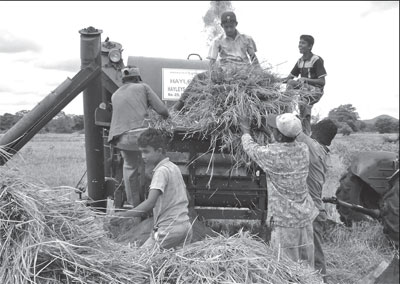Bridging between conflict resolution and economic growth
Lionel Wijesiri
Sri Lanka is an inspirational example of transformation to peace and
stability after over 30 years of terrorist violence. The major
developments surrounding the ending of paramilitary violence have
deservedly received publicity on a global scale.
Yet, sustained peace and economic development will require the
efforts of every part of society to promote a shared and better future
for everyone. There can be little doubt that the future of our country
depends upon the development of cooperative rather than conflictual
inter-communal relations. We are a multi-communal society, and it is
inconceivable that this will change in the foreseeable future.
|

Agriculture sector's contribution to economy vital |
Unified country
In recognition of its great importance, some intellectuals designate
inter-communal tolerance as one of the three pillars of national
reconciliation. The other two pillars are support for a political
tolerance, and the extension of legitimacy to the institutions of the
new political dispensation in the country.
Maintaining and promoting Sri Lanka as a unified entity has emerged
as a central plank in the agenda of most, if not all, major national
political parties. Indeed, each of the major parties perceives its
perspective as the only one laying the foundation of reconciliation and
unity of the country. However, looked at closely, the issue is more
complex than it seems, i.e. not just a black and white characterization.
With the defeat of the LTTE almost three years ago, opportunity
opened up for open and serious discussions of the core issues that gave
rise to the conflict. The government also understood it and initiate
talks with the Tamil National Alliance (TNA), with a view to reaching a
solution to this nonplussed problem. The LLRC report which was released
recently also stressed the importance of addressing the causes of the
issue and finding a political solution.
Latest reports reveal that talks between the government and the TNA
have been deadlocked on few main issues such as the granting of police
and land powers to Provincial Councils and the North-East merger.
Economic development
To breakthrough this stalemate, we must realize that the key to the
solution is the understanding of the real issue.
Viewing economic development and communal conflict as linked problems
requires reassessment of two widely accepted schools of thought about
the relationship between these phenomena. One school, prevalent in the
50s and 60s held that economic development would inevitably reduce the
potential for violent conflict, since growth would be rapid and the
resulting benefits diffused through all levels of society.
A second school held that economic development policies and those
relevant to 'maintaining political stability' could be formulated in
separate compartments.
Political changes from the late 1970s through the first eleven years
of 2000s proved both views wrong. Even in developing nations that did
really well economically, economic benefits did not diffuse to all
segments of society. Today, policy-makers are acknowledging that
economic development and conflict management policies cannot be
separated.
Formula
When economic development strategies are drafted we must acknowledge
the realities of communal diversity and the economically disruptive
potential of sustained communal conflict. Thus minimizing communal
tensions may be as important factor to economic growth as diversifying a
nation's industrial and agro base or promoting exports. Economic
development and conflict management strategies must be balanced to
provide reasonable economic benefits, with a reasonable degree of equity
across communal groups.
History tells us that there are no simple formulas for designing
policies to balance economic performance and inter-communal equity. Yet
there are few common-sense strategies. I can visualize three.
|

Southern Expressway, Gateway to Wonder |
We must attempt to reduce disparities in regional investment
allocations.
Economically deprived regions often provide fertile soil for
militancy. Fortunately, the present government has understood this
phenomenon very well. The government has already initiated fully-fledged
development ventures with the assistance of UN agencies and
international non-government agencies. A massive Joint Action Plan of
assistance to Northern Province has come into effect.
??The government leaders must be sensitized to minority community
concerns. That means there should be communal pluralism in economic
policy-making. Employment and promotion practices in both the public and
private sectors should provide opportunities for the ‘best and the
brightest’ among minority group members to become participants in the
system rather than turning them into alienated revolutionary leaders.
Interestingly, the government has understood the gravity of this issue
as well and continued to appoint Tamils to some high offices in state
sector. Recently, 1,000 Tamil applicants were attached to the Police
force in Northern District.
- Substantial devolution of power for Provincial Councils is
another strategy. What is meant by devolution is not federalism but
the empowerment of a local body by the lawful power to attend to a
defined number of specific tasks. Both power and accountability is
transferred in an ‘appropriated’ quantity (to be agreed upon) to the
elected body with the central government losing neither authority
nor accountability. There are pitfalls that have made our political
leaders reluctant to voluntarily embrace federalism. For example,
USA type of federalism did not avert a civil war in the mid-19th
century.
Responsible leaders
India’s form of federalism with ethno-linguistic territorial units
provides useful lessons. Some state leaders have been discreet about
seeking additional autonomy. Some groups, such as the Assamese, went as
far as demanding the right to conduct their own ‘foreign relations’.
Muslim Kashmiris and the Punjabi-speaking Sikhs have supported violent
separatist movements.
The political leaders also have a big role to play. First, they must
educate their supporters about the realities of economic development and
community conflict. Second, they must avoid promises that raise
unrealistic expectations. Third, when inevitable disruptions and
dislocations occur, they must resist the temptation to blame rival
communal groups.
Responsible leaders can boldly tell the public (as Minister Nimal
Siripala de Silva said recently) that it is not just about offering a
solution but also about convincing the minorities into accepting it and
the process involves major compromises on both parties, if the final
solution is to be accepted by the people of the South as well as the
North.
Realistically assessing the causes and costs of protracted communal
conflict may begin to convince development planners that programmes
which significantly increase the risks of communal conflict are not
economically justifiable. Such an assessment may alert present national
leaders to a harsh reality: the short term benefits from communally
divisive political strategies do not justify the long term social,
economic and political costs.
Reconciliation
Today the world economy is going through major realignments. Since we
live in the world of faltering economies we can become a victim of
negativism or work together towards it. Both optimism and pessimism have
infectious qualities. Therefore, we need today a set of responsible
politicians who look at the future of the country first. They have to
strike a difficult balance between maintaining political positions while
cooperating to share a long term national agenda. It is their collective
responsibility to reverse the mood of negativism today.
The political fraternity, no matter whether they represent the
government or the Opposition, must find a way that enables us to foster
the diversity inherent in us as it exists today without upholding our
alienation from each other. By exploring the concept of unity in
diversity as an expression of unity, we must offer a resolution to many
of the concerns felt by those who fear that awareness of differences can
lead to greater intolerance. This is all the more important because
political unity is the forerunner for the national unity.
Reconciliation requires that all Sri Lankans accept all their fellow
citizens as equals, extending dignity and respect to them. The
diminution of communal animosity implies that the communities get along
better with each other, that people come to interact with each other
more, communicate more, perhaps ultimately leading to greater
understanding and even acceptance. This would eventually result in the
appreciation of the value of communal diversity. Thus, an elemental
component of reconciliation is mutual respect, and a fundamental
ingredient in mutual respect is the willingness to judge people as
individuals, and not to brand them with group stereotypes. To the extent
that Sri Lankans do not respect and understand the various communal
groups making up the country, are fearful of them, and subscribe to
negative communal stereotypes, inter-communal reconciliation will never
be achieved. |



